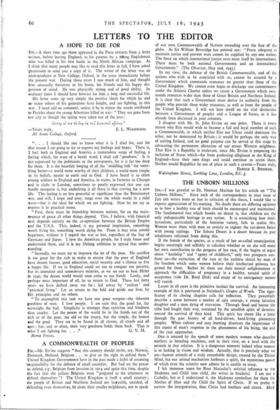A COMMONWEALTH OF PEOPLES
SIR,—Mr. Ervine suggests " that this country should invite, say, Norway, Denmark, Holland, Belgium . . . to give us the right to defend them." United Kingdom Governments have in the past made a habit of assuming 'responsibility for the defence of small countries. But had we the power to defend, e.g., Belgium from invasion in 1914 and again this time, despite the fact that the gallant Belgians were " prepared to the uttermost to defend themselves "? The United Kingdom is itself a small country ; the people of Britain and Northern Ireland are incrpable, unaided, of defending even themselves, let alone their smaller neighbours, not to speak of our own Commonwealth of Nations extending over the face of- the globe. As Sir William Beveridge has pointed out: " Force. adequate to maintain justice and prevent wars cannot be supplied by any one nation. The force on which international justice rests must itself be international. There must be both national Governments and an international Government." (The Observer, May 2nd, 1943.) In my view, the defence of the British Commonwealth, and of the nations who with to be associated with us, cannot be assured by a Government which commands resources no greater than those of the United Kingdom. We cannot even begin to discharge our commitments under the Atlantic Charter unless we create a Government which com- mands resources wider than those of Great Britain and Northern Ireland. It is clear- that such a Government must derive its authority from the people who provide those wider resources, as well as from the people of the United Kingdom. I will not here dwell on the vital distinction between a Government of peoples and a League of States, as it has already been discussed in your columns.
I disagree with Mr. St. John Ervine on one point. There is every reason why Eire would wish to become a full and loyal member of such a Commonwealth, in which neither Eire nor Ulster could dominate the other, nor be dominated by Britain ; it would be perhaps the only way of uniting Ireland, and no good purpose can be served at this stage by advocating the permanent alienation of our errant Western neighbour. That Eke is a Republic is irrelevant, since Mr. Ervine is proposing the inclusion of States which—far from professing' allegiance to the King of England—have their own kings and could continue to retain them. Neither would Republics be out of place in such a system.—Yours truly, HAROLD S. BIDMEAD.
Walsingham House, Seething Lane, London, E.C. 3.


























 Previous page
Previous page